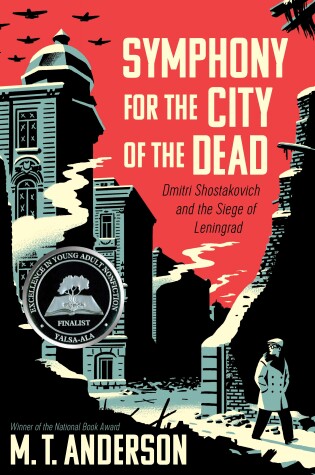Reviewed by Nicole Lynn on
Symphony for the City of the Dead is a YA non-fiction title that follows the life of Dmitri Shostakovich, a Russian composer who lived during both World Wars. Anderson takes readers on a journey through not only Shostakovich's life, but also through the history of Russia, specifically during War World II. Anderson interweaves Russian history & way of life with Shostakovich's journey as a composer and as a Russian citizen. Both insights combine to give readers an inside look into Russia during this pivotal time in history.
I absolutely loved this non-fiction work! Grant I have a slight bias as I have Russian ancestry so I was already intrigued to learn more. With that said, I still found the topic and the writing to be interesting. Some parts were definitely slow. I'm not always the biggest fan of non-fiction as the works tend to be dry and overly factual. However, weaving the biographic journey alongside the Russian history really made this novel/topic more interesting and easier to read. I do have to say that the work is dense at times. It's a long work and sometimes gives a bit too much detail that probably would have been okay to cut. So with this said, I'd recommend this to readers interested in Russian history or history as a whole. Otherwise, this book may leave some readers to abandon it.
As far as content, this book is definitely for young adults and over. Younger readers still might get a lot out of it, but there are some details that are a bit gruesome, especially during the discussion of the siege of Leningrad. With that said, I really found the content interesting. It was great seeing WWII from a Russian point of view. I never really read much about Russian history, so getting an inside account of someone's life during these times was very eye-opening. The Russian people suffered greatly before and during WWII, much from the hands of their own government. But the Russian people were resilient, especially as they did their best to survive the siege of Leningrad in which the German army decided to block the city from receiving any supplies and basically just starve them out. I could tell that Anderson had put a lot of research into this work as the details and facts were ever present throughout the work---giving it a very authentic feel.
Overall, I really really enjoyed this work. I found that I learned a lot not only about Shostakovich's life and impact on the Russian people & musical world, but also about Russia itself. If anything, this work encourages more empathy towards the Russian people which I definitely developed. Parts of this book left me so sad for what the Russian people had to go through. It was heartbreaking. This work definitely left an impact on me and I find myself reaching towards more non-fiction works about Russia. I'm hoping to learn even more since I have (as mentioned above) Russian ancestry.
In the end, I'd definitely recommend this book. Even if you're not that keen on history or non-fiction, I'd still suggest you give a try. I loved it that much!
Reading updates
- Started reading
- 29 June, 2016: Finished reading
- 29 June, 2016: Reviewed
